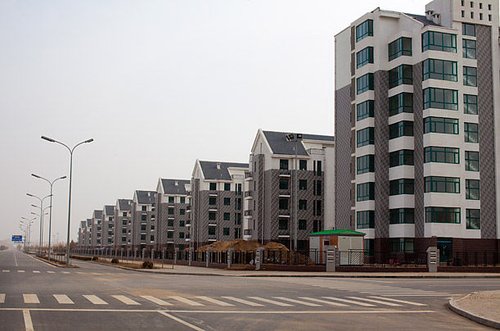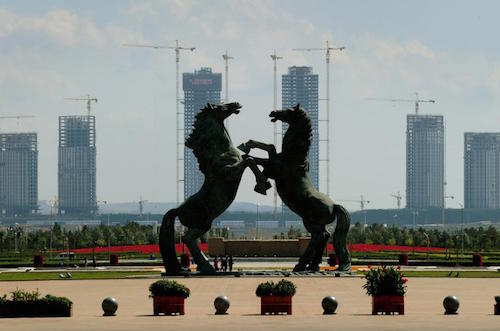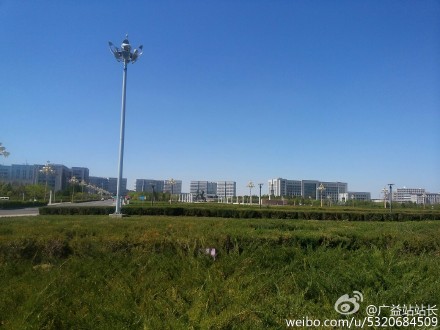China Insight
Chinese Ghost Cities Coming to Life
China’s so-called ‘ghost cities’ are a hot topic, with Ordos. Inner Mongolia. being of the most famous. Are China’s ‘Ghost Cities’ dead?
Published
9 years agoon

Brand new skyscrapers and shopping malls, but silent streets and empty apartments. China’s so-called ‘ghost cities’ are a hot topic in the media nowadays. The city of Ordos, Inner Mongolia, is one of the most famous. Are China’s ghost cities really dead?
Tens of millions of empty apartments in brand new cities all over China, deserted cinemas and quiet parks. It is an image that has captured the public imagination: ‘ghost cities’ have become a popular China topic in international media.
American author Wade Shepard spent the past few years touring these new territories for his book Ghost Cities of China (2015). Earlier this year, he came to Beijing’s Bookworm Literary Festival to speak about his project with New York Times reporter Dan Levin. Tickets to attend the event were sold out soon; everybody seems curious to know more about the modern phenomenon of ‘ghost cities’.
“The term ‘ghost cities’ is actually not appropriate,” Shepard tells Levin: “Ghost cities are places that once lived and then died. What I write about is new places that are underpopulated, and where houses are dark at night.” Shepard explains that most of China’s ‘ghost cities’ actually do have people living in them. The ones that don’t, are still under construction: “These new underpopulated cities are built by world luxury developers who are working on constructing new urban utopias all over China. The people living in these cities come from various places. Some are trendy people who are looking to live in a new city. Others have been relocated from their original villages. There are many from the countryside.”
“Never in my life had I seen anything like that: a brand new neighbourhood without any people in it.”
By 2020, China hopes to move 100 million people from the country’s farming regions into cities. China’s government-driven push for urbanization is part of changing the economy, going from export to domestic demand. New towns, with hospitals, roads and sport centers, are mushrooming all over China.
Wade Shepard’s fascination with China’s new towns started about ten years ago: “I saw a ‘ghost city’ for the first time in 2006, when I was a student near Hangzhou,” he says: “It happened in the small town of Tiantai. I took a wrong turn after getting off the bus, and I ended up in this new part of town with nobody there. Never in my life had I seen anything like it: a brand new neighbourhood with nobody there. I was so excited about it. My professors later told me those places were everywhere, they were not impressed. But it stuck with me. Just take any bus, and there is going to be a new city or neighbourhood under construction. I enjoyed walking around these areas. I went to Mongolia and forgot about them for a while, until I returned in 2012. I travelled around and tried to figure out what these places really were. They are the new landscape of China.”
 Ghost city in Beihai (Daily Mail).
Ghost city in Beihai (Daily Mail).
Shepard went out into China’s new areas by bicycle: “My objective was to go there and try to make friends. A foreigner showing up there is not a common thing, so many people want to know what you are doing there. It isn’t too difficult to talk to people.”
“People go from a traditional village structure to an elevator culture.”
There is an upside and a downside to the emergence of China’s new cities, Shepard explains: “There are people who are very happy to move there. Because they get a urban hukou, they feel like they’re moving up.”
A hukou is an urban residency permit. In China’s new towns, residents will get a different permit than their countryside one. It enables them to legally work within the cities and enjoy certain benefits. Health care, for example, is better than in the countryside. For some elderly people from rural areas, moving to the city could literally save their life.
 Quiet streets in Ordos (source).
Quiet streets in Ordos (source).
But there is also a big downside to China’s urban migration, Shepard says: “Many people are moving from a traditional village structure, where people make daily social connections, and ask each other what they are doing today and what’s for dinner tonight. With these high apartment buildings, this structure changes; they don’t do that anymore. It’s an elevator culture. People also come from so many different places that they don’t really connect.”
Some people who move to the city feel like they have lost their livelihood: “There are those who have been out in the hills for thousands of years. Once they’re in the towns, they suddenly have to pay for water and electricity. They have to go to the store to buy things.”
“Good behaviour is the answer to Ordeos becoming a civilized city.”
The issues that come with China’s new towns are also visible in The Land of Many Palaces, a documentary by Adam James Smith and Song Ting. Filmmaker Smith came to Amsterdam’s ‘Pakhuis de Zwijger’ on November 12th 2015 to screen the film and talk about it, an initiative by the Centre for Urban Studies (University of Amsterdam).
The Land of Many Palaces focuses on Ordos (鄂尔多斯), a 21st century city in the deserts of Inner Mongolia. The city holds an estimated one-sixth of the country’s coal reserves. After the coal was discovered, the region went from becoming one of the poorest to one of richest in China. Coal exploitation has created many millionaires investing in infrastructure and real estate. New city district Kangbashi sprung from the desert sands, and is the result of such an investment. Ordos Kangbashi was built between 2005 and 2010. It has sky scrapers, stadiums, a grand theater, museum and thousands of apartments. It is ready to house one million future residents.
The documentary starts with a scene that shows how Mrs. Yuan, the community manager, guides people through their new homes. Some don’t know how to use modern toilets, stoves or heaters. Mrs. Yuan teaches them, and also shows them how the television works (“There are over 100 channels!“) These new surroundings are in stark contrast with those of a nearby village, where one farmer is working on the land. The houses are abandoned. “They all moved to the new city,” he says: “In the countryside, you can live for months without spending money”.
The Land of Many Palaces shows that moving to one of China’s ‘ghost cities’ is not just about moving houses, it is about changing lifestyles. Farmers have to get used to living in the city and cope with all the things that come with it. Community staff members go to public places to teach them “how to become a civilized person”; telling people that good behaviour is the answer to Ordeos becoming a civilized city.
“If the developers of the new city need your land, they will take it anyway.”
Employment is a major problem in China’s new cities. Many farmers have ample experience in raising pigs and working on the land, but their experience is of no use in the urban environment where there is more need for hair stylists and shop attendants. The lack of jobs is one important reason why farmers don’t want to migrate from the countryside to the city.
One film scene shows a village where only two farmers are left. The rest of the villagers have already moved to the city. Ordos’s community manager visits the farmers to convince them to trade their clay houses for an apartment flat. When they decline, she says: ““If the developers of the new city need your land, they will take it anyway.”
“When we first visited Ordos in 2011, we expected to find a ghost city. Instead, we found a place that is becoming a city.”
After the end of the film’s screening, Adam Smith takes questions from the audience. About the start of the project, he says: “When we first visited Ordos in 2011, we expected to find a ghost city. Instead, we found a place that is becoming a city.”
Many of China’s so-called ghost cities look like ambitious dreams that turned into nightmares. “When we first started the project, we were somewhat indoctrinated by the general media reports in Europe and North America on how this top-down style of urbanization and city-building is wrong. But the more time we spent there, the more we started to think like the people there,” Smith says: “Nobody felt like what was going on was wrong. They were uplifted by the plan.”
Smith explains how many people, ironically, were pushed out of the cities to the countryside during the Cultural Revolution. In many of these areas it was hard to farm, and people struggled to survive. In some way, being taken to the city is like being saved for many: “We met very few people, if any, who were opposed.”
“Ghost cities are a hot topic, but ex-ghost cities are not.”
Although ghost cities are a hot topic, ex-ghost cities are not. “When a ‘ghost city’ comes to life we barely hear about it anymore”, Shepard writes. Although many of China’s new cities are still virtually empty, there are also those that have now become busier. Shepard names a few example in his article such as Dantu (Zhejiang), Wujin (Changzhou), and perhaps the most famous one, Shanghai’s Pudong.
“For the past few years I’ve been chasing reports of ghost cities around China, but I rarely ever find one that qualifies for this title. Though the international media claims that China is building cities for nobody, I often find something very different upon arrival”, Shepard writes.
Earlier this year, Global Times and China Daily issued a statement from the mayor of Ordos on Sina Weibo, saying: “We are not a ghost city“. Over the past year 10,000 houses were sold, it says. That still leaves 34,000 houses empty.
“They buy it to sell it, but none of those rich people actually live there,” one netizen responds: “The mayor just doesn’t wanna lose face.”
Other netizens say they like the city of Ordos: “The town is quite pretty, and the air is good,” user ‘392‘ writes. “I’ve just been to Ordos, and it’s really not as bad as the media says,” another netizen says: “The city is well-built, the air is good and it is safe.”
One other Weibo user also seems to like Ordos: “Finally a place in China that is not crowded yet.”
Maybe China’s ‘ghost cities’ are not that bad after all. They just might need another decade to really come to life.
– By Manya Koetse
Follow @WhatsOnWeibo
Thanks to The Bookworm & Pakhuis de Zwijger, Wade Shepard and Adam James Smith.
Interested in Wade Shepard’s work? For more information about his book click here, and you can find his blog here.
To know more about The Land of Many Palaces, check out the documentary website here.
featured image by Manya Koetse
©2015 Whatsonweibo. All rights reserved. Do not reproduce our content without permission – you can contact us at info@whatsonweibo.com.
Manya Koetse is the founder and editor-in-chief of whatsonweibo.com. She is a writer, public speaker, and researcher (Sinologist, MPhil) on social trends, digital developments, and new media in an ever-changing China, with a focus on Chinese society, pop culture, and gender issues. She shares her love for hotpot on hotpotambassador.com. Contact at manya@whatsonweibo.com, or follow on Twitter.

China Insight
The Tragic Story of “Fat Cat”: How a Chinese Gamer’s Suicide Went Viral
The story of ‘Fat Cat’ has become a hot topic in China, sparking widespread sympathy and discussions online.
Published
3 months agoon
May 9, 2024
The tragic story behind the recent suicide of a 21-year-old Chinese gamer nicknamed ‘Fat Cat’ has become a major topic of discussion on Chinese social media, touching upon broader societal issues from unfair gender dynamics to businesses taking advantage of grieving internet users.
The story of a 21-year-old Chinese gamer from Hunan who committed suicide has gone completely viral on Weibo and beyond this week, generating many discussions.
In late April of this year, the young man nicknamed ‘Fat Cat’ (胖猫 Pàng Māo, literally fat or chubby cat), tragically ended his life by jumping into the river near the Chongqing Yangtze River Bridge (重庆长江大桥) following a breakup with his girlfriend. By now, the incident has come to be known as the “Fat Cat Jumping Into the River Incident” (胖猫跳江事件).
News of his suicide soon made its rounds on the internet, and some bloggers started looking into what was behind the story. The man’s sister also spoke out through online channels, and numerous chat records between the young man and his girlfriend emerged online.
One aspect of his story that gained traction in early May is the revelation that the man had invested all his resources into the relationship. Allegedly, he made significant financial sacrifices, giving his girlfriend over 510,000 RMB (approximately 71,000 USD) throughout their relationship, in a time frame of two years.
When his girlfriend ended the relationship, despite all of his efforts, he was devastated and took his own life.
The story was picked up by various Chinese media outlets, and prominent social and political commentator Hu Xijin also wrote a post about Fat Cat, stating the sad story had made him tear up.
As the news spread, it sparked a multitude of hashtags on Weibo, with thousands of netizens pouring out their thoughts and emotions in response to the story.
Playing Games for Love
The main part of this story that is triggering online discussions is how ‘Fat Cat,’ a young man who possessed virtually nothing, managed to provide his girlfriend, who was six years older, with such a significant amount of money – and why he was willing to sacrifice so much in order to do so.
The young man reportedly was able to make money by playing video games, specifically by being a so-called ‘booster’ by playing with others and helping them get to a higher level in multiplayer online battle games.
According to his sister, he started working as a ‘professional’ video gamer as a means of generating money to satisfy his girlfriend, who allegedly always demanded more.
He registered a total of 36 accounts to receive orders to play online games, making 20 yuan per game (about $2.80). Because this consumed all of his time, he barely went out anymore and his social life was dead.
In order to save more money, he tried to keep his own expenses as low as possible, and would only get takeout food for himself for no more than 10 yuan ($1,4). His online avatar was an image of a cat saying “I don’t want to eat vegetables, I want to eat McDonald’s.”

The woman in question who he made so many sacrifices for is named Tan Zhu (谭竹), and she soon became the topic of public scrutiny. In one screenshot of a chat conversation between Tan and her boyfriend that leaked online, she claimed she needed money for various things. The two had agreed to get married later in this year.
Despite of this, she still broke up with him, driving him to jump off the bridge after transferring his remaining 66,000 RMB (9135 USD) to Tan Zhu.
As the story fermented online, Tan Zhu also shared her side of the story. She claimed that she had met ‘Fat Cat’ over two years ago through online gaming and had started a long distance relationship with him. They had actually only met up twice before he moved to Chongqing. She emphasized that financial gain was never a motivating factor in their relationship.
Tan additionally asserted that she had previously repaid 130,000 RMB (18,000 USD) to him and that they had reached a settlement agreement shortly before his tragic death.
Ordering Take-Out to Mourn Fat Cat
– “I hope you rest in peace.”
– “Little fat cat, I hope you’ll be less foolish in your next life.”
– “In your next life, love yourself first.”
These are just a few of the messages left by netizens on notes attached to takeout food deliveries near the Chongqing Yangtze River Bridge.

AI-generated image spread on Chinese social media in connection to the event.
As Fat Cat’s story stirred up significant online discussion, with many expressing sympathy for the young man who rarely indulged in spending on food and drinks, some internet users took the step of ordering McDonalds and other food delivery services to the bridge, where he tragically jumped from, in his honor.
This soon snowballed into more people ordering food and drinks to the bridge, resulting in a constant flow of delivery staff and a pile-up of take-out bags.

Delivery food on the bridge, photo via Weibo.
However, as the food delivery efforts picked up pace, it came to light that some of the deliveries ordered and paid for were either empty or contained something different; certain restaurants, aware of the collective effort to honor the young man, deliberately left the food boxes empty or substituted sodas or tea with tap water.

At least five restaurants were caught not delivering the actual orders. Chinese bubble tea shop ChaPanda was exposed for substituting water for milk tea in their cups. On May 3rd, ChaPanda responded that they had fired the responsible employee.
Another store, the Zhu Xiaoxiao Luosifen (朱小小螺蛳粉), responded on that they had temporarily closed the shop in question to deal with the issue. Chinese fast food chain NewYobo (牛约堡) also acknowledged that at least twenty orders they received were incomplete.
Fast food company Wallace (华莱士) responded to the controversy by stating they had dismissed the employees involved. Mixue Ice Cream & Tea (蜜雪冰城) issued an apology and temporarily closed one of their stores implicated in delivering empty orders.
In the midst of all the controversy, Fat Cat’s sister asked internet users to refrain from ordering take-out food as a means of mourning and honoring her brother.
Nevertheless, take-out food and flowers continued to accumulate near the bridge, prompting local authorities to think of ways of how to deal with this unique method of honoring the deceased gamer.
Gamer Boy Meets Girl
On Chinese social media, this story has also become a topic of debate in the context of gender dynamics and social inequality.
There are some male bloggers who are angry with Tan Zhu, suggesting her behaviour is an example of everything that’s supposedly “wrong” with Chinese women in this day and age.
Others place blame on Fat Cat for believing that he could buy love and maintain a relationship through financial means. This irked some feminist bloggers, who see it as a chauvinistic attitude towards women.
A main, recurring idea in these discussions is that young Chinese men such as Fat Cat, who are at the low end of the social ladder, are actually particularly vulnerable in a fiercely competitive society. Here, a gender imbalance and surplus of unmarried men make it easier for women to potentially exploit those desperate for companionship.
The story of Fat Cat brings back memories of ‘Mo Cha Official,’ a not-so-famous blogger who gained posthumous fame in 2021 when details of his unhappy life surfaced online.
Likewise, the tragic tale of WePhone founder Su Xiangmao (苏享茂) resurfaces. In 2017, the 37-year-old IT entrepreneur from Beijing took his own life, leaving behind a note alleging blackmail by his 29-year-old ex-wife, who demanded 10 million RMB (±1.5 million USD) (read story).
Another aspect of this viral story that is mentioned by netizens is how it gained so much attention during the Chinese May holidays, coinciding with the tragic news of the southern China highway collapse in Guangdong. That major incident resulted in the deaths of at least 48 people, and triggered questions over road safety and flawed construction designs. Some speculate that the prominence given to the Fat Cat story on trending topic lists may have been a deliberate attempt to divert attention away from this incident.
‘Fat Cat’ was cremated. His family stated their intention to take necessary legal steps to recover the money from his former girlfriend, but Tan Zhu reportedly already reached an agreement with the father and settled the case. Nevertheless, the case continues to generate discussions online, with some people wondering: “Is it over yet? Can we talk about something different now?”

Fat Cat images projected in Times Square
However, given that images of the ‘Fat Cat’ avatar have even appeared in Times Square in New York by now (Chinese internet users projected it on one of the big LED screens), it’s likely that this story will be remembered and talked about for some time to come.
UPDATE MAY 25
On May 20, local authorities issued a lengthy report to clarify the timeline of events and details surrounding the death of “Fat Cat,” which had attracted significant attention across China.
The report concluded that there was no fraud involved and that “Fat Cat” and his girlfriend were in a genuine relationship. Tan did not deceive “Fat Cat” for money; the transfers were voluntary. Furthermore, Tan returned most of the money to his parents.
The gamer’s sister is reportedly still being investigated for potentially infringing on Tan’s privacy by disclosing numerous private details to the public.
In the end, one thing is clear in this gamer’s tragic story, which is that there are no winners.
By Manya Koetse
– With contributions by Miranda Barnes and Ruixin Zhang
Independently reporting China trends for over a decade. Like what we do? Support us and get the story behind the hashtag by subscribing:
Spotted a mistake or want to add something? Please let us know in comments below or email us. First-time commenters, please be patient – we will have to manually approve your comment before it appears.
©2024 Whatsonweibo. All rights reserved. Do not reproduce our content without permission – you can contact us at info@whatsonweibo.com.
China Brands, Marketing & Consumers
A Brew of Controversy: Lu Xun and LELECHA’s ‘Smoky’ Oolong Tea
Chinese tea brand LELECHA faced backlash for using the iconic literary figure Lu Xun to promote their “Smoky Oolong” milk tea, sparking controversy over the exploitation of his legacy.
Published
3 months agoon
May 3, 2024
It seemed like such a good idea. For this year’s World Book Day, Chinese tea brand LELECHA (乐乐茶) put a spotlight on Lu Xun (鲁迅, 1881-1936), one of the most celebrated Chinese authors the 20th century and turned him into the the ‘brand ambassador’ of their special new “Smoky Oolong” (烟腔乌龙) milk tea.
LELECHA is a Chinese chain specializing in new-style tea beverages, including bubble tea and fruit tea. It debuted in Shanghai in 2016, and since then, it has expanded rapidly, opening dozens of new stores not only in Shanghai but also in other major cities across China.
Starting on April 23, not only did the LELECHA ‘Smoky Oolong” paper cups feature Lu Xun’s portrait, but also other promotional materials by LELECHA, such as menus and paper bags, accompanied by the slogan: “Old Smoky Oolong, New Youth” (“老烟腔,新青年”). The marketing campaign was a joint collaboration between LELECHA and publishing house Yilin Press.

Lu Xun featured on LELECHA products, image via Netease.
The slogan “Old Smoky Oolong, New Youth” is a play on the Chinese magazine ‘New Youth’ or ‘La Jeunesse’ (新青年), the influential literary magazine in which Lu’s famous short story, “Diary of a Madman,” was published in 1918.
The design of the tea featuring Lu Xun’s image, its colors, and painting style also pay homage to the era in which Lu Xun rose to prominence.
Lu Xun (pen name of Zhou Shuren) was a leading figure within China’s May Fourth Movement. The May Fourth Movement (1915-24) is also referred to as the Chinese Enlightenment or the Chinese Renaissance. It was the cultural revolution brought about by the political demonstrations on the fourth of May 1919 when citizens and students in Beijing paraded the streets to protest decisions made at the post-World War I Versailles Conference and called for the destruction of traditional culture[1].
In this historical context, Lu Xun emerged as a significant cultural figure, renowned for his critical and enlightened perspectives on Chinese society.
To this day, Lu Xun remains a highly respected figure. In the post-Mao era, some critics felt that Lu Xun was actually revered a bit too much, and called for efforts to ‘demystify’ him. In 1979, for example, writer Mao Dun called for a halt to the movement to turn Lu Xun into “a god-like figure”[2].
Perhaps LELECHA’s marketing team figured they could not go wrong by creating a milk tea product around China’s beloved Lu Xun. But for various reasons, the marketing campaign backfired, landing LELECHA in hot water. The topic went trending on Chinese social media, where many criticized the tea company.
Commodification of ‘Marxist’ Lu Xun
The first issue with LELECHA’s Lu Xun campaign is a legal one. It seems the tea chain used Lu Xun’s portrait without permission. Zhou Lingfei, Lu Xun’s great-grandson and president of the Lu Xun Cultural Foundation, quickly demanded an end to the unauthorized use of Lu Xun’s image on tea cups and other merchandise. He even hired a law firm to take legal action against the campaign.
Others noted that the image of Lu Xun that was used by LELECHA resembled a famous painting of Lu Xun by Yang Zhiguang (杨之光), potentially also infringing on Yang’s copyright.
But there are more reasons why people online are upset about the Lu Xun x LELECHA marketing campaign. One is how the use of the word “smoky” is seen as disrespectful towards Lu Xun. Lu Xun was known for his heavy smoking, which ultimately contributed to his early death.
It’s also ironic that Lu Xun, widely seen as a Marxist, is being used as a ‘brand ambassador’ for a commercial tea brand. This exploits Lu Xun’s image for profit, turning his legacy into a commodity with the ‘smoky oolong’ tea and related merchandise.
“Such blatant commercialization of Lu Xun, is there no bottom limit anymore?”, one Weibo user wrote. Another person commented: “If Lu Xun were still alive and knew he had become a tool for capitalists to make money, he’d probably scold you in an article. ”
On April 29, LELECHA finally issued an apology to Lu Xun’s relatives and the Lu Xun Cultural Foundation for neglecting the legal aspects of their marketing campaign. They claimed it was meant to promote reading among China’s youth. All Lu Xun materials have now been removed from LELECHA’s stores.

Statement by LELECHA.
On Chinese social media, where the hot tea became a hot potato, opinions on the issue are divided. While many netizens think it is unacceptable to infringe on Lu Xun’s portrait rights like that, there are others who appreciate the merchandise.
The LELECHA controversy is similar to another issue that went trending in late 2023, when the well-known Chinese tea chain HeyTea (喜茶) collaborated with the Jingdezhen Ceramics Museum to release a special ‘Buddha’s Happiness’ (佛喜) latte tea series adorned with Buddha images on the cups, along with other merchandise such as stickers and magnets. The series featured three customized “Buddha’s Happiness” cups modeled on the “Speechless Bodhisattva” (无语菩萨), which soon became popular among netizens.

The HeyTea Buddha latte series, including merchandise, was pulled from shelves just three days after its launch.
However, the ‘Buddha’s Happiness’ success came to an abrupt halt when the Ethnic and Religious Affairs Bureau of Shenzhen intervened, citing regulations that prohibit commercial promotion of religion. HeyTea wasted no time challenging the objections made by the Bureau and promptly removed the tea series and all related merchandise from its stores, just three days after its initial launch.
Following the Happy Buddha and Lu Xun milk tea controversies, Chinese tea brands are bound to be more careful in the future when it comes to their collaborative marketing campaigns and whether or not they’re crossing any boundaries.
Some people couldn’t care less if they don’t launch another campaign at all. One Weibo user wrote: “Every day there’s a new collaboration here, another one there, but I’d just prefer a simple cup of tea.”
By Manya Koetse
[1]Schoppa, Keith. 2000. The Columbia Guide to Modern Chinese History. New York: Columbia UP, 159.
[2]Zhong, Xueping. 2010. “Who Is Afraid Of Lu Xun? The Politics Of ‘Debates About Lu Xun’ (鲁迅论争lu Xun Lun Zheng) And The Question Of His Legacy In Post-Revolution China.” In Culture and Social Transformations in Reform Era China, 257–284, 262.
Independently reporting China trends for over a decade. Like what we do? Support us and get the story behind the hashtag by subscribing:
Spotted a mistake or want to add something? Please let us know in comments below or email us. First-time commenters, please be patient – we will have to manually approve your comment before it appears.
©2024 Whatsonweibo. All rights reserved. Do not reproduce our content without permission – you can contact us at info@whatsonweibo.com.
Subscribe

Weibo Watch: The Future is Here

“Bye Bye Biden”: Biden’s Many Nicknames in Chinese

Enjoying the ‘Sea’ in Beijing’s Ditan Park

A Triumph for “Comrade Trump”: Chinese Social Media Reactions to Trump Rally Shooting

Weibo Watch: Get Up, Stand Up

The Tragic Story of “Fat Cat”: How a Chinese Gamer’s Suicide Went Viral

“Old Bull Eating Young Grass”: 86-Year-Old Chinese Painter Fan Zeng Marries 36-Year-Old Xu Meng

A Brew of Controversy: Lu Xun and LELECHA’s ‘Smoky’ Oolong Tea

Singing Competition or Patriotic Fight? Hunan TV’s ‘Singer 2024’ Stirs Nationalistic Sentiments

Zara Dress Goes Viral in China for Resemblance to Haidilao Apron

Weibo Watch: The Battle for the Bottom Bed

About the “AI Chatbot Based on Xi Jinping” Story

China’s Intensified Social Media Propaganda: “Taiwan Must Return to Motherland”

Weibo Watch: Telling China’s Stories Wrong

Saying Goodbye to “Uncle Wang”: Wang Wenbin Becomes Chinese Ambassador to Cambodia
Get in touch
Would you like to become a contributor, or do you have any tips or suggestions? Get in touch here!
Popular Reads
-

 China Insight3 months ago
China Insight3 months agoThe Tragic Story of “Fat Cat”: How a Chinese Gamer’s Suicide Went Viral
-

 China Music4 months ago
China Music4 months agoThe Chinese Viral TikTok Song Explained (No, It’s Not About Samsung)
-

 China Digital10 months ago
China Digital10 months agoToo Sexy for Weibo? Online Discussions on the Concept of ‘Cābiān’
-

 China Arts & Entertainment12 months ago
China Arts & Entertainment12 months agoBehind 8 Billion Streams: Who is Dao Lang Cursing in the Chinese Hit Song ‘Luocha Kingdom’?










